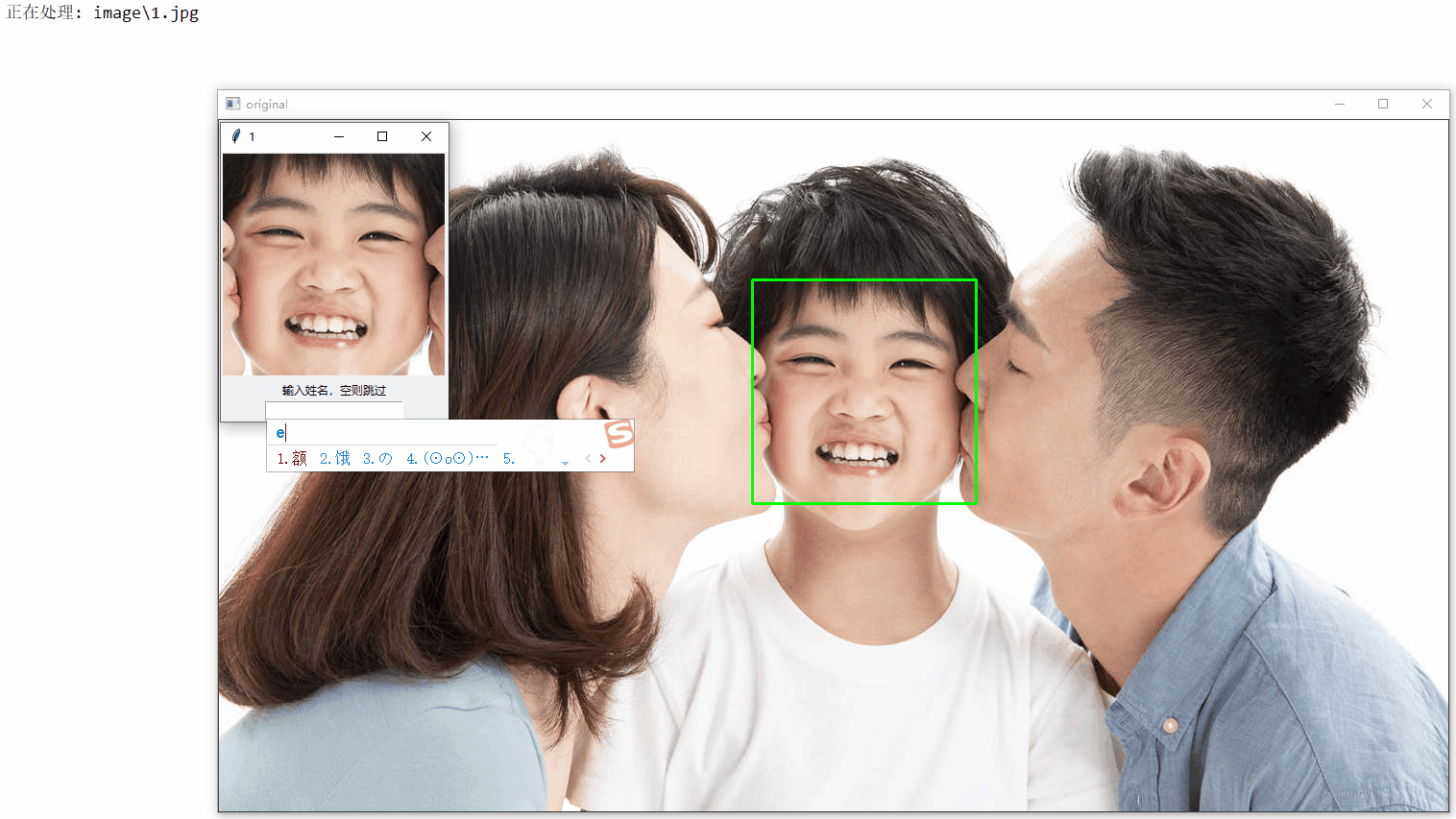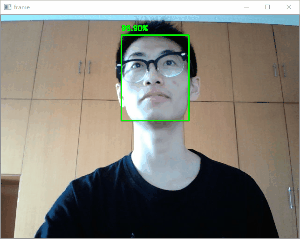文章目录
- 问题描述
- 解决方案
- 安装
- 人脸检测
- 1. HARR特征级联分类器
- 2. LBP特征级联分类器
- 3. DNN预训练模型
- 4. MTCNN预训练模型
- 5. HOG人脸检测器
- 6. MMOD预训练模型
- 7. RetinaFace预训练模型
- 运算时间
- 人脸识别
- 1. LBPH人脸识别器
- 2. OpenFace人脸识别器(尚未完成)
- 3. DeepID人脸识别器(尚未完成)
- 4. FaceNet人脸识别器(尚未完成)
- 5. InsightFace(尚未完成)
- 6. ArcFace(尚未完成)
- 摄像头捕获
- 戴圣诞帽
- TODO
- 人脸识别常用数据集
- 备注
- 参考文献
本文代码、图片及模型下载地址
问题描述
1.jpg

2.jpg

人脸检测:把人脸框出来。
人脸对齐:把人脸的关键点定位出来。
人脸识别:判断出谁是谁。
解决方案
- 人脸检测,收集人脸数据
- 提取人脸深度特征
- 训练人脸识别分类器
- 人脸检测,调用识别分类器进行人脸识别
安装
pip install opencv-python
pip install opencv-contrib-python人脸检测
1. HARR特征级联分类器
使用 OpenCV 的级联分类器 CascadeClassifier 加载预训练模型 haarcascade_frontalface_default.xml,该模型使用 AdaBoost 算法,运行速度十分快,在2013年12月19日上传。
代码
import cv2
# 读取文件
image = '1.jpg'
model = 'haarcascade_frontalface_default.xml'
image = cv2.imread(image) # 读取图片
model = cv2.CascadeClassifier(model) # 加载模型
# 人脸检测
faces = model.detectMultiScale(image)
for (x, y, w, h) in faces:
cv2.rectangle(image, (x, y), (x + w, y + h), (0, 255, 0), thickness=2) # 画出人脸矩形框
# 显示和保存图片
cv2.imshow('result', image)
cv2.waitKey(0)
cv2.destroyAllWindows()
cv2.imwrite('result.jpg', image)
print('已保存')效果


缺点:
- 仅适用于正面人脸。
- 鲁棒性不足,经常翻车。例如衣服有个地方很像人脸也会检测出来。
2. LBP特征级联分类器
使用 OpenCV 的级联分类器 CascadeClassifier 加载预训练模型 lbpcascade_frontalface_improved.xml,该模型在2016年12月21日上传。
代码
import cv2
# 读取文件
image = '1.jpg'
model = 'lbpcascade_frontalface_improved.xml'
image = cv2.imread(image) # 读取图片
model = cv2.CascadeClassifier(model) # 加载模型
# 人脸检测
faces = model.detectMultiScale(image)
for (x, y, w, h) in faces:
cv2.rectangle(image, (x, y), (x + w, y + h), (0, 255, 0), thickness=2) # 画出人脸矩形框
# 显示和保存图片
cv2.imshow('result', image)
cv2.waitKey(0)
cv2.destroyAllWindows()
cv2.imwrite('result.jpg', image)
print('已保存')效果


3. DNN预训练模型
使用 OpenCV 的 DNN 人脸识别预训练模型,该模型基于残差网络 ResNet-10 的 SSD 网络模型,运行速度十分快,在2018年上传。
- Caffe模型
- TensorFlow模型
代码
import cv2
import numpy as np
# 读取文件
image = '1.jpg'
net = cv2.dnn.readNetFromCaffe('deploy.prototxt', 'res10_300x300_ssd_iter_140000_fp16.caffemodel') # Caffe模型
# net = cv2.dnn.readNetFromTensorflow('opencv_face_detector_uint8.pb', 'opencv_face_detector.pbtxt') # TensorFlow模型
image = cv2.imread(image) # 读取图片
height, width, channel = image.shape # 高、宽、通道数
# 人脸检测
blob = cv2.dnn.blobFromImage(cv2.resize(image, (300, 300)), 1.0, (300, 300), (104.0, 177.0, 123.0)) # 调整大小并降低光照的影响
net.setInput(blob) # 设置输入
detections = net.forward() # 检测结果
faces = detections[0, 0] # 人脸结果
for face in faces:
confidence = face[2] # 置信度
if confidence > 0.5: # 置信度阈值设为0.5
box = face[3:7] * np.array([width, height, width, height]) # 人脸矩形框坐标
pt1 = int(box[0]), int(box[1]) # 左上角坐标
pt2 = int(box[2]), int(box[3]) # 右下角坐标
cv2.rectangle(image, pt1, pt2, (0, 255, 0), thickness=2) # 画出人脸矩形框
text = '{:.2f}%'.format(confidence * 100) # 置信度文本
startX, startY = pt1
y = startY - 10 if startY - 10 > 10 else startY + 10
org = (startX, y) # 文本的左下角坐标
cv2.putText(image, text, org, cv2.FONT_HERSHEY_SIMPLEX, 0.5, (0, 255, 0), thickness=2) # 画出置信度
# 显示和保存图片
cv2.imshow('result', image)
cv2.waitKey(0)
cv2.destroyAllWindows()
cv2.imwrite('result.jpg', image)
print('已保存')效果


小男孩人脸置信度仅为50.38%,有待提高
4. MTCNN预训练模型
MTCNN 即 Multi-task Cascaded Convolutional Networks ,多任务级联卷积神经网络,可完成人脸检测和人脸对齐。
- detect_face.py 构建MTCNN网络
- 模型权重:det1.npy、det2.npy、det3.npy
代码
import cv2
import detect_face
import tensorflow as tf
# 读取文件
image = '1.jpg'
image = cv2.imread(image) # 读取图片
pnet, rnet, onet = detect_face.create_mtcnn(tf.Session(), None) # 加载模型
# 人脸检测
minsize = 20 # 人脸最小尺寸
threshold = [0.6, 0.7, 0.7] # MTCNN三个阶段的阈值
factor = 0.709 # 人脸大小缩放金字塔的比例
margin = 44 # 边框周围的裁剪边距
image_rgb = cv2.cvtColor(image, cv2.COLOR_BGR2RGB)
faces, _ = detect_face.detect_face(image_rgb, minsize, pnet, rnet, onet, threshold, factor)
for face in faces:
face = face.astype(int)
(x, y, w, h) = face[:4]
cv2.rectangle(image, (x, y), (w, h), (0, 255, 0), thickness=2) # 画出人脸矩形框
# 显示和保存图片
cv2.imshow('result', image)
cv2.waitKey(0)
cv2.destroyAllWindows()
cv2.imwrite('result.jpg', image)
print('已保存')若报错
TypeError: reduce_max() got an unexpected keyword argument 'keepdims',原因是TensorFlow版本低于1.7.0,将keepdims替换成keep_dims即可
效果


5. HOG人脸检测器
安装步骤:
代码
import cv2
import dlib
# 读取文件
image = '1.jpg'
image = cv2.imread(image)
image_rgb = cv2.cvtColor(image, cv2.COLOR_BGR2RGB)
# 人脸检测
model = dlib.get_frontal_face_detector() # 加载模型
faces = model(image_rgb, 1)
for face in faces:
(x, y, w, h) = face.left(), face.top(), face.right(), face.bottom()
cv2.rectangle(image, (x, y), (w, h), (0, 255, 0), thickness=2) # 画出人脸矩形框
# 显示和保存图片
cv2.imshow('result', image)
cv2.waitKey(0)
cv2.destroyAllWindows()
cv2.imwrite('result.jpg', image)
print('已保存')效果


6. MMOD预训练模型
使用 Dlib 的 MMOD人脸检测器,基于 DNN 实现,下载预训练模型 mmod_human_face_detector.dat.bz2 并解压。
代码
import cv2
import dlib
# 读取文件
image = '1.jpg'
image = cv2.imread(image)
image_rgb = cv2.cvtColor(image, cv2.COLOR_BGR2RGB)
# 人脸检测
model = dlib.cnn_face_detection_model_v1('mmod_human_face_detector.dat') # 加载模型
faces = model(image_rgb, 1)
for face in faces:
face = face.rect
(x, y, w, h) = face.left(), face.top(), face.right(), face.bottom()
cv2.rectangle(image, (x, y), (w, h), (0, 255, 0), thickness=2) # 画出人脸矩形框
# 显示和保存图片
cv2.imshow('result', image)
cv2.waitKey(0)
cv2.destroyAllWindows()
cv2.imwrite('result.jpg', image)
print('已保存')效果


7. RetinaFace预训练模型
使用 InsightFace 的 RetinaFace 预训练模型,该模型达到了 WiderFace 的 SOTA。
安装
pip install insightface代码
import cv2
from insightface.model_zoo import face_detection
# 读取文件
image = cv2.imread('1.jpg') # 读取图片
model = face_detection.retinaface_r50_v1() # 加载模型
model.prepare(ctx_id=-1, nms=0.4)
# 人脸检测
faces, landmark = model.detect(image, threshold=0.5, scale=1.0)
for face in faces:
(x, y, w, h, confidence) = face
pt1 = int(x), int(y)
pt2 = int(w), int(h)
cv2.rectangle(image, pt1, pt2, (0, 255, 0), thickness=2) # 画出人脸矩形框
text = '{:.2f}%'.format(confidence * 100) # 置信度文本
startX, startY = pt1
y = startY - 10 if startY - 10 > 10 else startY + 10
org = (startX, y) # 文本的左下角坐标
cv2.putText(image, text, org, cv2.FONT_HERSHEY_SIMPLEX, 0.5, (0, 255, 0), thickness=2) # 画出置信度
# 显示和保存图片
cv2.imshow('result', image)
cv2.waitKey(0)
cv2.destroyAllWindows()
cv2.imwrite('result.jpg', image)
print('已保存')效果


运算时间
对比不同方法的运算时间
import cv2
import time
import numpy as np
# 读取图片
image = '2.jpg'
image = cv2.imread(image)
# 级联分类器
model = cv2.CascadeClassifier('haarcascade_frontalface_default.xml') # 加载模型
beg = time.time()
faces = model.detectMultiScale(image)
end = time.time()
print('级联分类器 {:.2f} s'.format(end - beg))
# DNN Caffe模型
net = cv2.dnn.readNetFromCaffe('deploy.prototxt', 'res10_300x300_ssd_iter_140000_fp16.caffemodel') # Caffe模型
beg = time.time()
blob = cv2.dnn.blobFromImage(cv2.resize(image, (300, 300)), 1.0, (300, 300), (104.0, 177.0, 123.0))
net.setInput(blob)
detections = net.forward()
end = time.time()
print('DNN Caffe模型 {:.2f} s'.format(end - beg))
# DNN TensorFlow模型
net = cv2.dnn.readNetFromTensorflow('opencv_face_detector_uint8.pb', 'opencv_face_detector.pbtxt') # TensorFlow模型
beg = time.time()
blob = cv2.dnn.blobFromImage(cv2.resize(image, (300, 300)), 1.0, (300, 300), (104.0, 177.0, 123.0))
net.setInput(blob)
detections = net.forward()
end = time.time()
print('DNN TensorFlow模型 {:.2f} s'.format(end - beg))结果
模型 | 大小 | 运算时间 |
级联分类器 | 0.89 MB | 0.35 s |
Caffe模型 | 5.12 MB | 0.04 s |
TensorFlow模型 | 2.63 MB | 0.04 s |
人脸识别
1. LBPH人脸识别器
使用 LBPHFaceRecognizer (Local Binary Patterns Histograms),局部二值模式直方图,可降低特征维度。而OpenCV另两个人脸识别算法 EigenFaceRecognizer 和 FisherFaceRecognizer 考虑总体特征。
image

代码
import os
import cv2
import time
import sqlite3
import pathlib
import numpy as np
from tkinter import *
from PIL import Image, ImageTk, ImageFont, ImageDraw
name = '' # 当前人脸的名字
lastid = 0 # 用户最新的id
id_name_map = {} # 用户id对应名字
name_id_map = {} # 用户名对应id
def cv2_putChinese(image, chinese, xy, font='msyh.ttc', size=25, fill=(255, 0, 0)):
"""cv2转PIL绘制中文后转回cv2"""
image = cv2.cvtColor(image, cv2.COLOR_BGR2RGB)
image = Image.fromarray(image)
font = ImageFont.truetype(font, size)
draw = ImageDraw.Draw(image)
draw.text(xy, chinese, font=font, fill=fill)
image = cv2.cvtColor(np.array(image), cv2.COLOR_RGB2BGR)
return image
def show_on_tkinter(image, title):
"""用tkinter显示图片"""
def save(event):
global name
global lastid
name = entry.get()
if name:
if name not in name_id_map:
c.execute('INSERT INTO users (`name`) VALUES (?)', (name,)) # 插入数据库
conn.commit() # 提交
lastid += 1 # 更新用户最新的id
id_name_map[lastid] = name
name_id_map[name] = lastid # 更新所有用户
if name_id_map:
print('数据库中的用户有: {}'.format(' '.join(name_id_map))) # 所有用户
os.makedirs('dataset/{}'.format(name), exist_ok=True) # 保存人脸图像目录
filename = 'dataset/{}/{}.jpg'.format(name, int(time.time())) # 保存人脸图像文件名
image.save(filename) # 用Image.save()避免cv2.imwrite()不能中文名的缺点
window.destroy()
window = Tk()
window.title(title)
image = cv2.cvtColor(image, cv2.COLOR_BGR2RGB)
height, width, channels = image.shape
canvas = Canvas(window, width=width, height=height)
canvas.pack()
image = Image.fromarray(image)
photo = ImageTk.PhotoImage(image)
canvas.create_image(0, 0, image=photo, anchor=NW)
label = Label(window, text='输入姓名,空则跳过')
label.pack(anchor=CENTER)
entry = Entry(window)
entry.pack(anchor=CENTER)
entry.focus_force()
entry.bind('<Return>', func=save)
window.mainloop()
# 人脸数据库
conn = sqlite3.connect('database.db') # 人脸数据库
c = conn.cursor()
sql = '''
CREATE TABLE IF NOT EXISTS users (
`id` INTEGER UNIQUE PRIMARY KEY AUTOINCREMENT,
`name` TEXT UNIQUE
);
'''
c.execute(sql) # 用户表
users = c.execute('SELECT * FROM users')
for (id, name) in users:
lastid = id
id_name_map[lastid] = name
name_id_map[name] = id
if name_id_map:
print('数据库中的用户有: {}'.format(' '.join(name_id_map))) # 所有用户
# 记录人脸
os.makedirs('dataset', exist_ok=True) # 保存人脸图像目录
model = cv2.CascadeClassifier('haarcascade_frontalface_default.xml') # 加载模型
images = pathlib.Path('image').rglob('*')
for image in images:
print('正在处理: {}'.format(image))
image = str(image)
image = cv2.imread(image)
original = image.copy()
cv2.imshow('original', original)
gray = cv2.cvtColor(image, cv2.COLOR_BGR2GRAY) # 转灰度图
faces = model.detectMultiScale(gray)
for i, (x, y, w, h) in enumerate(faces):
face = image[y:y + h, x:x + w]
cv2.rectangle(original, (x, y), (x + w, y + h), (0, 255, 0), thickness=2)
cv2.imshow('original', original)
show_on_tkinter(face, title=i + 1)
cv2.destroyAllWindows()
conn.close()
# 训练人脸识别器
recognizer = cv2.face.LBPHFaceRecognizer_create()
ids = []
faces = []
for name in pathlib.Path('dataset').rglob('*'):
images = pathlib.Path(name).glob('*')
for image in images:
ids.append(name_id_map[name.name])
image = Image.open(image).convert('L')
image = np.array(image)
faces.append(image)
ids = np.array(ids)
recognizer.train(faces, ids)
recognizer.save('recognizer.yml') # 保存人脸识别器模型
# 使用人脸识别器
recognizer = cv2.face.LBPHFaceRecognizer_create()
recognizer.read('recognizer.yml') # 加载人脸识别器
img = cv2.imread('image/2.jpg') # 选一张图片识别
gray = cv2.cvtColor(img, cv2.COLOR_BGR2GRAY)
faces = model.detectMultiScale(gray)
for (x, y, w, h) in faces:
cv2.rectangle(img, (x, y), (x + w, y + h), (0, 255, 0), thickness=2)
ids, conf = recognizer.predict(gray[y:y + h, x:x + w])
name = id_name_map[ids]
print(ids, name, conf)
img = cv2_putChinese(img, name, (x + 2, y + h - 5))
cv2.imshow('result', img)
cv2.waitKey(0)
cv2.destroyAllWindows()
cv2.imwrite('result.jpg', img)
print('已保存')记录人脸

效果

2. OpenFace人脸识别器(尚未完成)
Face Recognition using OpenFace
3. DeepID人脸识别器(尚未完成)
4. FaceNet人脸识别器(尚未完成)
使用 FaceNet 的 人脸识别预训练模型,模型基于 Inception ResNet v1,在2018年上传。
随意选一个模型:
- LFW准确率:99.05%
- 训练数据集:CASIA-WebFace
- LFW准确率:99.65%
- 训练数据集:VGGFace2
Train a classifier on own images · davidsandberg/facenet Wiki · GitHub
5. InsightFace(尚未完成)
开源大佬面对面:InsightFace带你打造开箱即用的人脸识别系统
6. ArcFace(尚未完成)
摄像头捕获
import cv2
import numpy as np
net = cv2.dnn.readNetFromTensorflow('opencv_face_detector_uint8.pb', 'opencv_face_detector.pbtxt') # TensorFlow模型
def face_recognition(image):
height, width, channel = image.shape # 高、宽、通道数
blob = cv2.dnn.blobFromImage(cv2.resize(image, (300, 300)), 1.0, (300, 300), (104.0, 177.0, 123.0)) # 调整大小并降低光照的影响
net.setInput(blob) # 设置输入
detections = net.forward() # 检测结果
faces = detections[0, 0] # 人脸结果
for face in faces:
confidence = face[2] # 置信度
if confidence > 0.5: # 置信度阈值设为0.5
box = face[3:7] * np.array([width, height, width, height]) # 人脸矩形框坐标
pt1 = int(box[0]), int(box[1]) # 左上角坐标
pt2 = int(box[2]), int(box[3]) # 右下角坐标
cv2.rectangle(image, pt1, pt2, (0, 255, 0), thickness=2) # 画出人脸矩形框
text = '{:.2f}%'.format(confidence * 100) # 置信度文本
startX, startY = pt1
y = startY - 10 if startY - 10 > 10 else startY + 10
org = (startX, y) # 文本的左下角坐标
cv2.putText(image, text, org, cv2.FONT_HERSHEY_SIMPLEX, 0.5, (0, 255, 0), thickness=2) # 画出置信度
return image
if __name__ == '__main__':
cap = cv2.VideoCapture(0) # 打开摄像头
if not cap.isOpened(): # 没打开直接退出
print("Cannot open camera")
exit()
while True:
ret, frame = cap.read() # 逐帧捕获
if not ret: # 正确读取ret为True
print("Can't receive frame (stream end?). Exiting ...")
break
frame = face_recognition(frame)
cv2.imshow('frame', frame) # 显示
if cv2.waitKey(1) == ord('q'): # q退出
break
cap.release() # 释放摄像头
cv2.destroyAllWindows()效果

戴圣诞帽
图片尺寸会被统一,仍需优化

import cv2
import numpy
import random
from PIL import Image
from pathlib import Path
# 参数
HAT_PATH = './hat/' # 圣诞帽图像路径
MODEL_PATH = 'haarcascade_frontalface_default.xml' # 人脸识别预训练模型路径
# 读取
model = cv2.CascadeClassifier(MODEL_PATH)
# 读取圣诞帽
hats = [] # 圣诞帽
hats_portion = [] # 圣诞帽宽高比
for i in Path(HAT_PATH).glob('*.png'):
hat = Image.open(i)
width, height = hat.size
hats.append(hat)
hats_portion.append(width / height)
def std_size(imagePath):
'''转标准尺寸'''
pic = Image.open(imagePath)
width, height = pic.size
portion = width / height
if portion < 1: # 肖像
if portion <= 0.75:
pic_w = 960
pic_h = round(960 / portion)
box = (0, round((pic_h - 1280) / 2), 960, round(pic_h / 2 + 640))
if portion > 0.75:
pic_h = 1280
pic_w = round(1280 * portion)
box = (round((pic_w - 960) / 2), 0, round(pic_w / 2 + 480), 1280)
elif portion > 1: # 风景
if portion >= 1.3333:
pic_h = 960
pic_w = round(960 * portion)
box = (round((pic_w - 1280) / 2), 0, round(pic_w / 2 + 640), 960)
if portion < 1.3333:
pic_w = 1280
pic_h = round(1280 / portion)
box = (0, round((pic_h - 960) / 2), 1280, round(pic_h / 2 + 480))
elif portion == 1: # 正方形
(pic_w, pic_h) = (960, 960)
box = (0, 0, 960, 960)
pic = pic.resize((pic_w, pic_h))
pic = pic.crop(box)
return pic
def face_detect(pil_image):
'''人脸检测
:param pil_image: PIL读取的图片
'''
image = cv2.cvtColor(numpy.array(pil_image), cv2.COLOR_RGB2BGR) # PIL转cv
gray = cv2.cvtColor(image, cv2.COLOR_BGR2GRAY)
faces = model.detectMultiScale(
gray,
scaleFactor=1.2,
minNeighbors=5,
minSize=(50, 60),
flags=cv2.CASCADE_SCALE_IMAGE
)
return faces
def get_hat(x, y, w, h):
# 设定每个帽子的概率
num = random.randint(1, 100)
if num in range(1, 17):
hat_num, offset1, offset2, offset3 = (0, 1.2, .05, .67) # hat1
elif num in range(17, 33):
hat_num, offset1, offset2, offset3 = (1, 1.3, -.4, .62) # hat2
elif num in range(33, 49):
hat_num, offset1, offset2, offset3 = (2, .9, .05, .8) # hat3
elif num in range(91, 101):
hat_num, offset1, offset2, offset3 = (3, 1.2, .05, .67) # green hat
elif num in range(49, 65):
hat_num, offset1, offset2, offset3 = (4, 1.2, -.1, 1.2) # jiao1
elif num in range(65, 81):
hat_num, offset1, offset2, offset3 = (5, 1, 0, 1.2) # jiao2
elif num in range(81, 91):
hat_num, offset1, offset2, offset3 = (6, .9, .05, 1) # tree
hat_portion = hats_portion[hat_num]
(hat_w, hat_h) = (int(w * offset1), int(w * offset1 / hat_portion))
# print('hat size:', hat_w, hat_h)
hatter = hats[hat_num].resize((hat_w, hat_h))
(hat_x, hat_y) = (int(x + w * offset2), int(y - hat_h * offset3))
hat_pos = (hat_x, hat_y)
# print('hat at:', hat_x, hat_y)
return (hatter, hat_pos)
def wear_hat(imagePath, output, show=False):
'''戴圣诞帽
:param imagePath: 图片路径
:param output: 保存路径
:param show: 是否显示中间过程
:return:
'''
# 人脸检测
image = std_size(imagePath)
faces = face_detect(image)
if show:
temp_image = image.copy()
# 戴圣诞帽
for (x, y, w, h) in faces:
# print('face at:', x, y, w, h)
(hatter, hat_pos) = get_hat(x, y, w, h)
image.paste(hatter, hat_pos, hatter)
image.save(output)
if show:
# 原图
temp_image = cv2.cvtColor(numpy.array(temp_image), cv2.COLOR_RGB2BGR)
cv2.imshow('1', temp_image)
cv2.waitKey(0)
# 人脸检测框
for (x, y, w, h) in faces:
cv2.rectangle(temp_image, (x, y), (x + w, y + h), (0, 255, 0), thickness=2)
cv2.imshow('1', temp_image)
cv2.waitKey(0)
# 戴圣诞帽
temp_image = Image.fromarray(cv2.cvtColor(temp_image, cv2.COLOR_BGR2RGB))
for (x, y, w, h) in faces:
(hatter, hat_pos) = get_hat(x, y, w, h)
temp_image.paste(hatter, hat_pos, hatter)
temp_image = cv2.cvtColor(numpy.array(temp_image), cv2.COLOR_RGB2BGR) # PIL转cv
cv2.imshow('1', temp_image)
cv2.waitKey(0)
cv2.destroyAllWindows()
if __name__ == '__main__':
wear_hat('2.jpg', 'result.jpg', show=True)TODO
- 人脸识别:即认出谁是谁
- OpenVINO预训练模型
需要Intel的CPU
参考文献:
人脸识别常用数据集
数据集 | 图片数量 | 人脸数量 | 描述 |
LFW (Labeled Faces in the Wild) | 13233 | 5749 | 人脸识别的基准数据集 |
YTF (YouTube Faces) | 3425视频 | 1595 | |
CALFW (Cross-Age LFW) | 跨年龄 | ||
CPLFW (Cross-Pose LFW) | 跨姿势 | ||
CFP (Celebrities in Frontal-Profile in the Wild) | 7000 | 500 | 知名人物的前额,侧脸 |
12240 | 570 | 跨年龄人脸识别数据集 | |
470万 | 672057 | 平均每人7张图片 | |
IJB-C (IARPA Janus Benchmark C) | 138000图+11000视频 | ||
FRVT (Face Recognition Vendor Test) | 考虑精度、速度、存储、可靠性等 | ||
200万 | 2622 | 噪声较小,常作为训练模型的数据 | |
331万 | 9131 | 噪声较小,跨年龄、姿态、种族,常作为训练模型的数据 | |
494414 | 10575 | 国内颇具盛名的人脸识别数据集 |
参考文献
- opencv haarcascades 预训练模型
- OpenCV Document
- wx-fancy-pic: 微信公众号服务,根据用户发来的照片自动生成海报或有趣的照片
- OpenCV4 DNN人脸检测
- OpenCV中支持的人脸检测方法整理与汇总
- MTCNN实时人脸检测网络详解
- OpenVINO Toolkit Intel’s Pre-Trained Models
- openface: Face recognition with deep neural networks.
- facenet: Face recognition using Tensorflow
- awesome-Face_Recognition
- FaceBoxes—官方开源CPU实时高精度人脸检测器
- OpenCV Face Recognition - PyImageSearch
- 人脸识别常用数据集介绍(附下载链接)及常用评估指标
- 人脸识别最新进展以及工业级大规模人脸识别实践探讨
- 格灵深瞳开源全球最大最干净的人脸识别数据集:Glint360K
- A full guide to face detection
- insightface/detection/RetinaFace





















